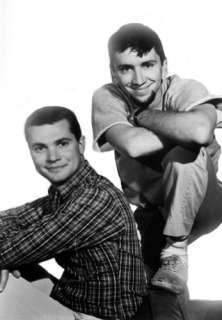The Many Loves of Dobie Gillis

The Many Loves of Dobie Gillis aired from 1959 to 1963 on CBS. Dobie Gillis (Dwayne Hickman) was an Ordinary High School Student who wanted simple things in life; money, respect, and the love of beautiful women. His best friend was an oddball beatnik named Maynard G. Krebs (Bob Denver) who sported a goatee and was allergic to work. Dobie perennially found himself pursuing beautiful women who were rarely interested in him, while his dogged childhood friend Zelda insisted she was destined to be his ultimate match.
It broke a lot of new ground for TV, being one of the first shows to have the characters comment directly to the audience, as well as one of TV's first "counter-cultural" characters (Maynard). It was also much more slyly scripted than a lot of the more dated shows of the era, and was noted for rapid-fire dialogue exchanges (one of the most dialogue-heavy sitcoms of the era).
Two of the show's best-remembered cast members only appeared in its first season: Warren Beatty (in one of his first roles as Dobie's Worthy Opponent, the handsome, rich Milton Armitage) and Tuesday Weld (as Dobie's primary dream girl, the blonde, money-hungry schemer Thalia Menninger).
The show's characters also served as an inspiration for the cast of another CBS show, the Saturday morning cartoon Scooby-Doo! Where are you? (Think Fred as Dobie, Shaggy as Maynard, Velma as Zelda, and Daphne as Thalia.)
There is more here.
- Actor Allusion: The reunion has Maynard mention having been shipwrecked on an island for some time.
- Always Second Best: Dobie encounters this a lot with Milton and other rich rivals for his various love interests. Zelda has a similar situation with regards to Thalia and Dobie's other crushes.
- Beard of Evil: Inverted with Maynard's ubiquitous goatee, at a time when such chin lettuce was more often associated with more villainous types.
- Beatnik: Maynard G. Krebs, the first regular "beatnik" character on U.S. TV, at a time when such counter-cultural archetypes were rarely seen on the tube.
- Berserk Button: Don't mention work around Maynard.
- Betty and Veronica
- Breaking the Fourth Wall: Most episodes begin with Dobie briefly addressing the audience with a little background exposition of the plot to follow. (Occasionally, these monologues would also appear mid-show as transitional links.) The scenes invariably had Dobie in front of the famous Rodin sculpture "The Thinker." (The earliest episode openings would start with Dobie emulating The Thinker's pose.) One clever variation had Dobie in traction, unable to speak, while his nurse read his narration from his written notes!
- The Bus Came Back: After being absent since the first season, Thalia returns in season 4's "What's a Little Murder Between Friends?"
- California University
- Catch Phrase: At least Once an Episode, Dobie's father would be heard to intone, "I gotta kill that boy. I just gotta." Also Maynard's "WORK!" and "You Rang?". And all the characters would habitually intone an obligatory (though insincere) "No offense!" right after saying something insulting about someone in their presence.
- Drop-In Character
- Emotionally Tongue-Tied
- Gilligan Cut: Used frequently, several years before Bob Denver's next sitcom would become more popularly associated with the trope.
- Girl of the Week: Among the actresses that played Dobie's love interests were such then-unknowns as Marlo Thomas, Sally Kellerman, Ellen Burstyn (then billed as Ellen McRae), Barbara Babcock, Sherry Jackson, Diana Millay, Barbara Bain, and Yvonne Craig.
- Gold Digger: Thalia
- Hollywood Ugly: Zelda
- Inadvertent Entrance Cue: Whenever someone described something unattractive or undesirable, Maynard would pop up and say "You rang?"
- Irony as She Is Cast: Sheila James Kuehl (then billed as Sheila James) as Zelda, a very man-hungry (well, Dobie-hungry) young woman. In reality, Ms. Kuehl is an out-and-proud lesbian. (Although not "out" during the show's run in the homophobic late 50's and early 60's, she was already well aware of her orientation at the time.)
- Kaleidoscope Hair: Enforced. Dobie's actor (Dwayne Hickman) was made to dye his hair blonde in order to distance him from a previous role. When the show was well established, he was allowed to return to his natural brown hair color; however, at times he had to go blonde again.
- Magic Realism
- Man Child: Maynard
- Manic Pixie Dream Girl: Zelda
- My Name Is Not Durwood: A running gag has people frequently mishearing Dobie's name as "Dopey."
- Never Say That Again
- No Fourth Wall
- Reunion Show: Bring Me the Head of Dobie Gillis, a TV movie that aired in 1988.
- There was also Whatever Happened to Dobie Gillis?, an unsold 1977 pilot for a prospective Revival series.
- Suspiciously Similar Substitute: Warren Beatty left the show midway through the first season, so his character of Milton Armitage was replaced with his (similarly wealthy and handsome) cousin Chatsworth Osborne, Jr.
- Verbal Tic: Mere mention of the word "work" in the presence of employment-averse Maynard always triggered a spasmodic, panicked interjection of "WORK?!"
- Victorious Childhood Friend: The reunion movie reveals that Dobie married Zelda.